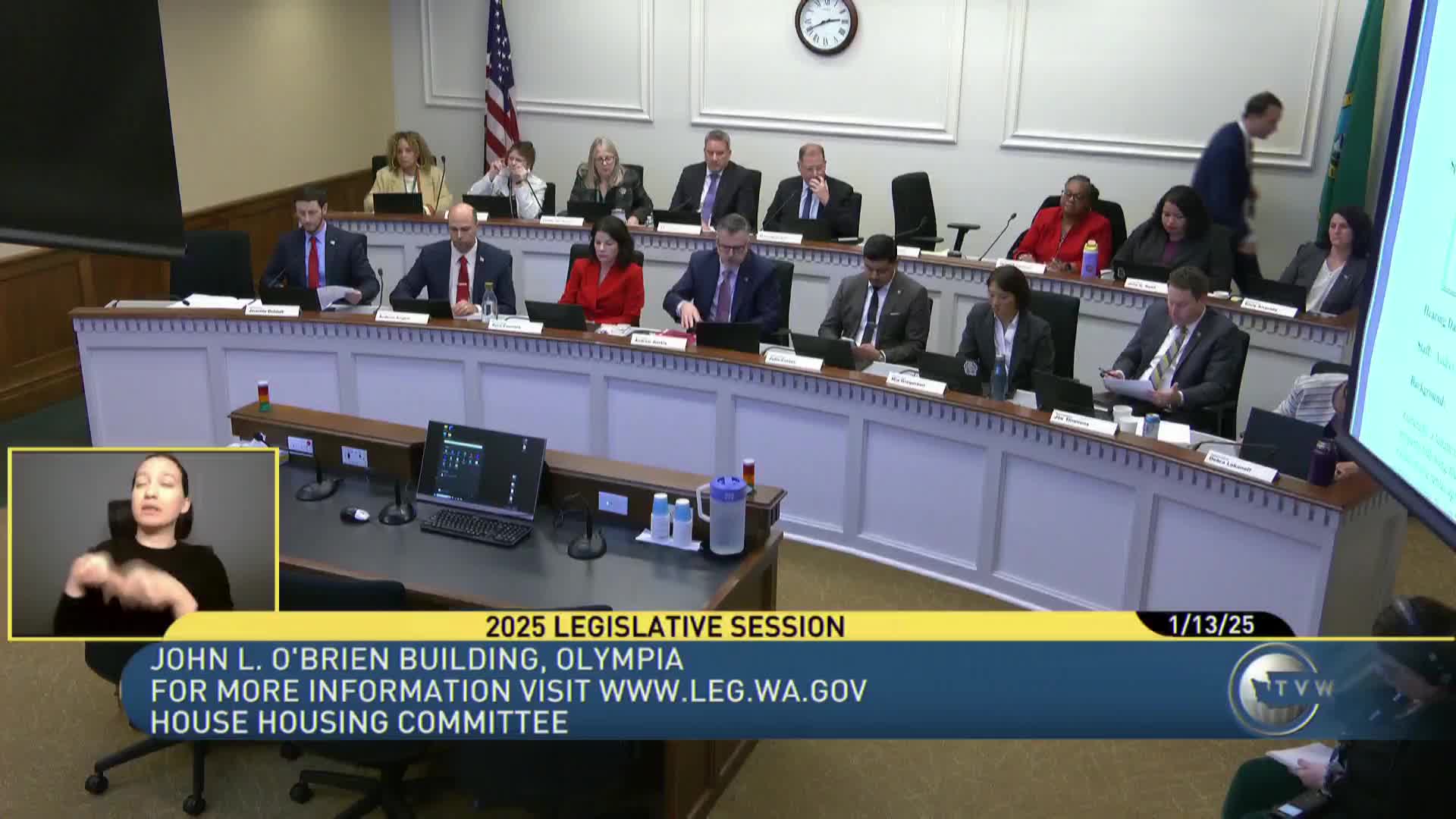Committee hears House Bill 1217 to cap rent and fee increases at 7% and bar first-year increases; tenants and landlords testify for and against
Get AI-powered insights, summaries, and transcripts
Subscribe
Summary
House Bill 1217 would limit rent and fee increases to 7% in any 12-month period and bar increases during the first 12 months of a tenancy, with exemptions for new construction, public housing authorities, and certain nonprofit or income-restricted units. Supporters said the bill provides immediate relief for renters; landlords and industry groups
The House Housing Committee on Jan. 13 held an extended public hearing on House Bill 1217, a proposal to limit rent and fee increases to 7 percent in any 12‑month period and to prohibit rent and fee increases during the first 12 months of a tenancy for units covered by the Residential Landlord Tenant Act and the Manufactured Mobile Home Landlord Tenant Act.
Audrey Vasek, committee staff, said the bill also lists exemptions — including newly constructed dwelling units built within the last 10 years, units operated by public housing authorities or certain nonprofit organizations, certain qualified low-income housing developments, owner‑occupied rentals, and a limited exemption following the qualified sale of a manufactured-home community. Vasek said enforcement mechanisms include attorney general enforcement under the Consumer Protection Act and a private cause of action for damages; the Department of Commerce would be required to create an online landlord resource center and to contract for an independent social-vulnerability assessment of the bill’s impacts.
Representative Emily Alvarado (34th Legislative District), the bill’s sponsor, said rising rents are harming households statewide and argued the measure balances tenant protections with landlords’ ability to invest and make a profit. “No single policy can fix our housing crisis. No bill is a silver bullet but this bill is the single most cost effective way that we can immediately stop the devastating impacts of excessive rent increases on renters and manufactured homeowners in Washington,” Alvarado said. She described caps, notice requirements and exemptions as a “balanced policy” that preserves the ability to set market rent at a new tenancy while restraining year‑to‑year increases.
The hearing drew broad public testimony for and against the bill: - Tenant and tenant‑advocacy testimony described repeated and large rent increases, housing instability, and impacts on seniors and people on fixed incomes. Stephanie Tidholm described multiple substantial rent increases during her housing history; Joanna Ricks Johnson, a Colville tribal member and disabled veteran, said her family had moved five times in four years because of habitability and rent increases. Tina Hammond, a 64‑year‑old manufactured‑home owner, said a 12% lot‑rent increase last year forced her to cut heating and delay medications. - Manufactured‑home residents and advocates urged passage. Chris Walker, who lives in a senior manufactured‑home community, told the committee many residents “are on fixed incomes” and asked the committee to “pass bill 1217.” - Small landlords and some owners raised concerns about cost pressures, including property taxes, insurance, utility and regulatory costs. Kelly Reinhart, a landlord of two duplexes, said modest increases (under 5 percent for her long‑term tenants) have allowed her to operate; she warned that rapid, large increases could destabilize tenants and create frequent vacancies. Property‑management representatives and industry groups urged changes to avoid driving investment to neighboring states with different rent‑stabilization rules. - Industry groups expressed formal opposition or “respectful opposition.” Riley Benge of Washington Realtors warned the bill’s flat cap could make Washington less competitive for investment versus states with inflation‑linked caps, and the Building Industry Association said the policy could produce inequitable outcomes for people who are not currently stably housed.
Several witnesses, including cities and property managers, asked the committee to clarify how the bill would treat manufactured‑home parks and whether landlords could reset rents to market on turnover when a different tenant signs a new lease or when ownership changes. Property managers raised concerns about steep insurance increases and other external cost drivers that they said could exceed a numeric annual cap.
Committee members asked sponsors and witnesses about data cited in the bill’s intent section (references to U.S. Census Bureau findings on rent increases) and about how the proposal compares to rent‑stabilization regimes in Oregon and California; witnesses noted differences in exemption lengths and indexation provisions. No vote was taken. The committee closed the Jan. 13 testimony and said further hearings will follow; the chair requested additional written testimony from those who could not testify in person.
What’s next: sponsors and opponents said they expect negotiation on details — including the cap formula, exemptions for new construction, manufactured‑home park provisions, notice and fee limits, and enforcement mechanisms — before any committee vote.
